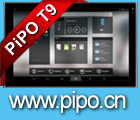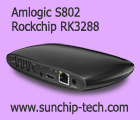I had the pleasure of an impromptu chat with Toradex’s CEO (Samuel Imgrueth), COO (Stephan Dubach) and CMO (Daniel Lang) set against a gorgeous locale close to the Toradex headquarters in Switzerland. We talked about Toradex’s history, key focus and offerings and a lot more.
Category: Toradex
NXP i.MX 8X, CODESYS, EtherCAT, OPC UA, Android, RIMAC at the Toradex Booth
Toradex’s NXP i.MX 8X based System on Module. The i.MX 8X SoCs comes with up to 4x Cortex-A35 and 1x Cortex-M4. The Cortex-A35 is an extreme power-effective 64bit Arm Core, the M4 is used to offload real-time tasks, check for errors to increase safety, and check for errors to further lower the power consumption.
The RAM and cache on the 8X can be protected with ECC (Error Correction Code) which make these SoMs ideal for critical applications such as Industrial Automation, Medical, Railways, etc.
Toradex shows the Colibri iMX8X running a GPU accelerated Qt application. The Apalis iMX8X with ECC will be available soon The Industrial 4.0 demo shows a Real-time Time Motion Control Application. A Toradex Apalis iMX6 powers the Midi-Eagle Computer from Diamond Systems featuring dual ethernet interfaces A CODESYS Soft PLC Stack is running on top of real-time Linux with a motion controller software. The motors are connected via EtherCAT. The system also utilizes an OPC-UA Server from Matrikon The demo was put together by the experienced Toradex Partner BE.Services.
RIMAC, famous for its insanely fast electric cars, demonstrates how the pin-compatibility of the Toradex SoM allows them to simply upgrade from an Apalis iMX6 to an Apalis iMX8QM.
Kynetics is providing Android support for Toradex modules. They show off Android on the i.MX 8 QuadMax but also on the i.MX 7 utilizing the integrated Cortex-M4 Core.
This allows it to run on the Cortex M4 Core an RTOS such as FreeRTOS and offload tasks.
Kynetics also provides an over-the-air (OTA) solution called Update Factory for IoT applications based on Eclipse hawkBit.
Toradex https://www.toradex.com/
Diamond Systems Midi-Eagle Computers http://www.diamondsystems.com/products/midieagle
Matrikon OPC UA https://www.matrikonopc.com/
BE.services https://www.be-services.net/
RIMAC and Toradex https://www.toradex.com/applications/automotive-infotainment/rimac
Kynetics https://www.kynetics.com/android-bsp/toradex
Linux microPlatform, secure IoT updates with Foundries.io and Toradex
At Linaro Connect Vancouver 2018, Foundries.io and Toradex discuss Linux microPlatform, what microPlatform is and how it helps Toradex to build their next generation Software Platform.
Linux microPlatform is an open source, minimal, secure, updatable Operating System based on OpenEmbedded / Yocto Project. Toradex ports the microPlatform to its Arm-based System on Modules and it uses it as the basis for its future Software Planform called Torizon.
Linux microPlatform modularized the embedded software stack utilizing Docker Containers, and so it provides a robust and simple to update platform. It includes a secure Uptane-compliant over-the-air update solution using OSTree.
Founderies.io provides continuous updates to Linux microPlatform, as they believe the latest software is the most secure software.
Toradex also elaborates on its plans to simplify developers’ lives with its Torizon platform leveraging Linux microPlatforms, such as simplifying application development, enabling a modern DevOps workflow and easing migration from Windows-based systems.
Get early access to all videos (weeks/months before everyone else), get business cards to companies filmed, support my video-blogging work, become a member at http://youtube.com/charbax/join
Diamond Systems ARM Computing EAGLE I/O-Rich SBCs and Carrier Boards
Diamond Systems, a global supplier of compact, rugged, I/O-rich embedded computing solutions for real-world applications in a broad range of markets, unveiled its EAGLE family of compact, rugged ARM single-board computers and carrier boards designed to work with the Toradex Apalis family of ARM computer-on-modules (COMs), see my Toradex at ARM Techcon video here.
The product line is composed of two models, the full-size, full-featured Eagle and its smaller sized, low-cost Eaglet. For greatest convenience, customers may purchase a fully configured off the shelf solution from Diamond, including a select ARM module and heat sink installed, or they may purchase the baseboard and ARM module separately for greater configuration flexibility and lower unit cost. Development Kits, including the fully configured SBC, pre-configured Linux OS on a microSD card, and a full cable kit, are available from Diamond Systems.
Key highlights of the Eagle/Eaglet family are long product lifetime, configuration flexibility, and a wide range of I/O.
You can read the press release and access links to EAGLE product web pages, datasheets, photos here.
Since 1989, Silicon Valley-based Diamond Systems Corporation has provided compact, rugged, board- and system-level real world embedded computing solutions to companies in a broad range of markets, including transportation, energy, aerospace, defense, manufacturing, medical and research.
The company is renowned as an innovator of embedded I/O standards and technologies; it was an early adopter of PC/104 module technology, originated the FeaturePak I/O module and RSODIMM rugged memory module standards, and holds a patent for a unique analog I/O autocalibration technique.
Diamond’s extensive product line includes compact, highly integrated single board computers (SBCs); an extensive line of expansion modules for analog and digital I/O, wired and wireless communications including multiprotocol serial ports and Ethernet switches, GPS, solid-state disk, and power supply functions; and complete, rugged, system-level solutions.
Interested developers can contact Diamond Systems directly here:
Mark Wilson
Marketing Manager
mwilson@diamondsystems.com
Diamond Systems Corporation
http://diamondsystems.com
Toradex NXP i.MX7 and NVIDIA TK1 Demos at ARM TechCon 2016
Toradex is showcasing the popular TAQ balancing robot featuring a Colibri iMX7 SoM based on NXP’s new heterogeneous multicore i.MX7 processor with Dual-Core ARM Cortex-A7 and additional ARM Cortex-M4 core for low-power, real-time or connected-standby IoT. Amid Toradex’s broad product portfolio is the new high performance Apalis TK1 SoM based on NVIDIA’s Tegra K1 featuring a Quad-Core ARM Cortex-A15 processor with 192 CUDA cores for high-end computer vision and 4k video applications for example. Other demos include an impressive Qt Linux fast boot demo featuring an automotive cluster on Apalis i.MX6.
Project developers can contact Toradex here:
seattle@toradex.com
http://www.toradex.com
Ubuntu booth tour at MWC 2016, Convergence, Phones, Tablets, Drones, IoT and more
After my interview with Mark Shuttleworth, here’s my 17-minute Ubuntu booth tour video. Meizu Pro 5 Ubuntu Edition comes with 5.7″ 1080p Exynos7420 octa-core ARM Cortex-A57/53, 3GB RAM. At MWC 2016, Canonical is showing Ubuntu Convergence running on a Nexus 4, running a “Full Ubuntu” Unuity 8 out of the phone on the slimport HDMI output from the phone. Running the exact same Ubuntu on desktops and on ARM Powered Smartphone. Canonical is really excited to see more powerful hardware to come out running this Ubuntu Convergence solution, here poiting out that the phone runs LibreOffice, Firefox, GIMP, xchat, gedit, making it possible to use this as a desktop device.
BQ Aquaris M10 Ubuntu Edition Tablet runs on the MediaTek MT8163A Quad-core ARM Cortex-A53 with Mali GPU and 2GB RAM. It runs a full Ubuntu, enabling to set it to Desktop mode to run any Ubuntu app.
Snappy Ubuntu Core delivers applications for Drones, Robots and the IoT market. Here showing off the UAVIA Snappy Ubuntu Core powered drone, running on a Toradex Freescale i.MX6 Quad-core ARM Cortex-A9 System on Module, making a more intelligent drone better to enable autonomous flight thanks to sense and avoid technologies. It also facilitates maintenance of drones by making remote software deployments secure, effective and failsafe. Snappy Ubuntu Core also is being demonstrated for home automation running on a Qualcomm Dragonboard 410c.
Samsung also showcases their new Samsung Artik 1, Samsung Artik 5 dual-core ARM Cortex-A7 with Mali400MP2 GPU, 512MB RAM, 4GB eMMC flash, built in wireless WiFi, Bluetooth, BLE, ZigBee, 6LoWPAN based Thread protocol for Google Nest. Samsung Artik 10 octa-core quad ARM Cortex-A15 and quad ARM Cortex-A7. All Samsung IoT Artik modules are offered using their new ePoP (package-on-package) design, optimized for the IoT market. Artik includes also cloud-based device management based on SmartThings Open Cloud providing SDKs to help connect endpoint devices to the cloud using Java, Android, iOS, PHP, and Python tools. Open Cloud is partially based on the Samsung SAMI data driven development platform. The Atik 5 development board with the module is available for $100 at digikey
Also at the Ubuntu booth is the lead developer for the Etherum decentralized software platform, using blockchain to power the IoT market. Ethereum is a decentralized platform that runs smart contracts: applications that run exactly as programmed without any possibility of downtime, censorship, fraud or third party interference. The Ethereum team now works on Slock.it, where the vision is that an unused bicycle in your shed gets a new lease on life. Parking spots can be sublet on demand. Airbnb apartments become fully automated. It’s the future infrastructure of the Sharing Economy, Slock.it was shown at the Lift Conference here
Toradex shows Freescale i.MX7, Windows 10 IoT Core on ARM
Toradex shows their upcoming Freescale i.MX7 based System on Module (SOM). The module is pin compatible with the existing Toradex Colibri Modules based on i.MX6, Vybrid, PXA and Nvidia Tegra. The i.MX7 is a heterogeneous asymmetric multicore system including a Dual-core ARM Cortex-A7 and a ARM Cortex-M4 microcontroller for real-time. The Toradex computer module will be available at the official i.MX7 launch early next year. Also first time in public, Toradex shows Microsoft Windows 10 IoT Core on an ARM based SOM which is designed to be used directly in volume. The module is based on a Nvidia Tegra 3 which is pin compatible with the I.MX7 and provides a fully HW accelerated DirectX driver.
Toradex Apalis T30 Module Computer
Toradex shows their Apalis T30 module is a module computer with a Nvidia Tegra 3 processor with 2gb of ram. The price of the Apalis T30 is 169 USD individually. The Appalis T30 can be connected to a desktop motherboard with a desktop Nvidia graphics card and can be used with a desktop linux environment with CUDA support. Nvidia Tegra 4 is not available for embedded use so Tegra 5 will be the next platform available.
$26 Freescale Vybrid powered Colibri VF50 and VF61 by Toradex
The all-new additions to Toradex’ Colibri product family are a couple of Freescale Vybrid SoC-powered low-power, small form-factor devices. The Colibri VF50 and the Colibri VF61, based respectively on Freescale Vybrid VF5xx and Vybrid VF6xx family of SoC. To give you a little more information, the Vybrid VF5xx family is a single-core (ARM Cortex-A5) solution with 1.5 MB on-chip SRAM, DDR2/3, high-speed USB with PHY, dual Ethernet and a host of other interfaces. On the other hand, the Vybrid VF6xx family is a dual-core (ARM Cortex-A5 plus ARM Cortex-M4) solution with 1.5 MB on-chip SRAM, DDR2/3, dual XiP quad SPI memory interfaces, dual high-speed USB with PHY, dual Ethernet, and a digital/analog video camera interface. The modules are also priced at an unbelievable USD 26 and USD 39 respectively for the Colibri VF50 and the Colibri VF61 (for high volumes). Toradex’ Colibri VF50 and VF61 are both SODIMM sized computer module with an emphasis, according to the company, on delivering cost-effective CPU, and graphic performance with a low power footprint. The dual-core on the Colibri VF61 makes it ideal for solutions that run a commercial operating system on the Cortex-A class core while the Cortex-M core runs an RTOS for time and security-critical operations. This kind of arrangement eliminates the need for an external MCU or field-programmable gate array (FPGA).





